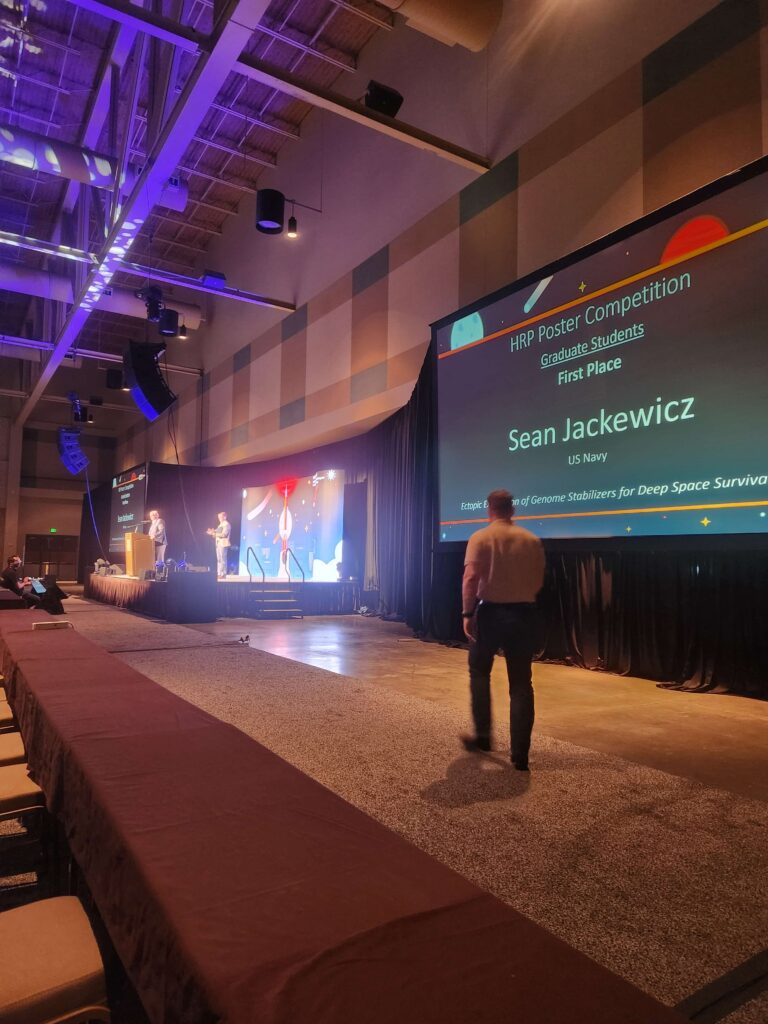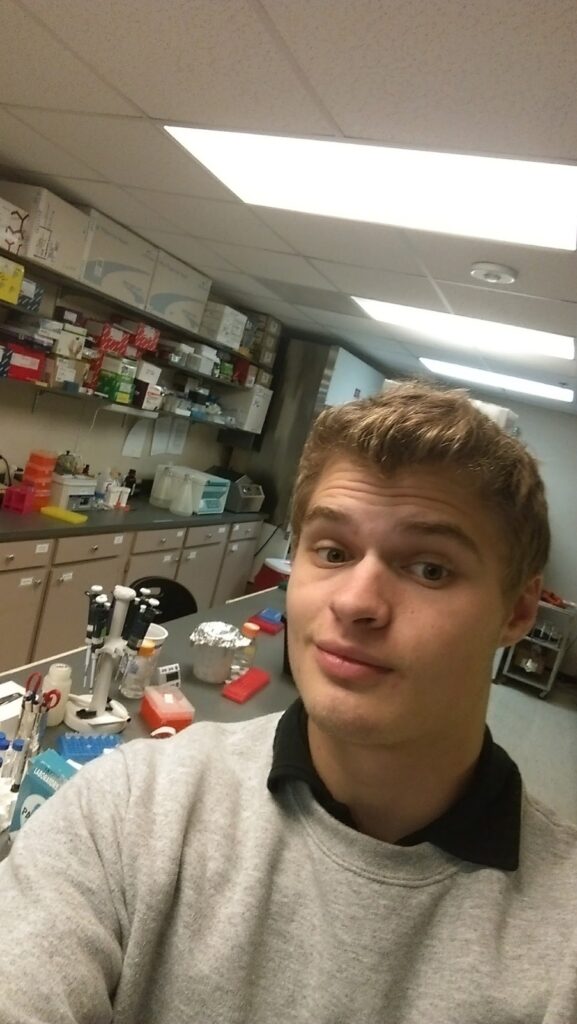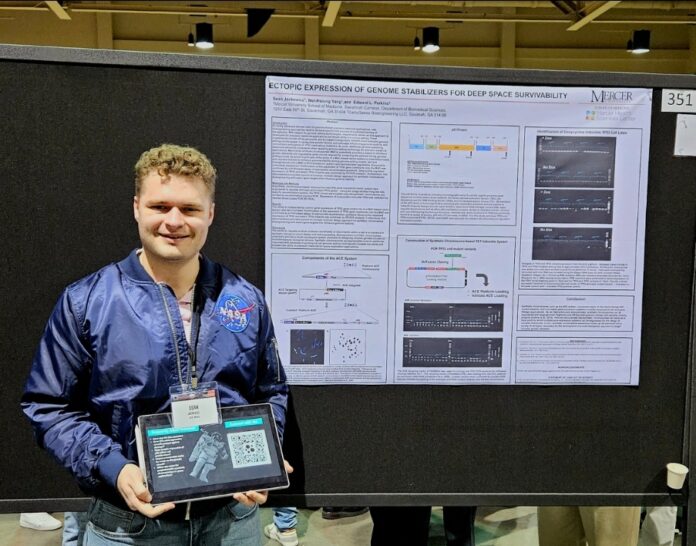SAVANNAH — A Mercer University School of Medicine student won first place in a NASA poster competition for a project judges deemed most innovative and likely to enable human exploration of space.
Fourth-year medical student Sean Jackewicz described his project as a “biological spacesuit,” showcasing how a synthetic chromosome could be used to increase astronauts’ resistance to radiation.
“I couldn’t believe it. It felt incredible being recognized,” Jackewicz said.
He presented his research in February at the NASA Human Research Program Investigators’ Workshop, an annual conference for research on safe, productive and efficient human spaceflight. His poster was chosen as the best out of hundreds of others from world-class labs.
Space radiation is different than radiation on Earth, and may place astronauts at risk for radiation sickness, cancer, central nervous system issues and degenerative diseases, according to NASA.
Using a synthetic chromosome to increase astronauts’ resistance to radiation allows for a temporary genetic modification, making the change safer because it can be reversed. This proprietary technology was developed by Ed Perkins, Ph.D., and Amy Greene, Ph.D., at CarryGenes Bioengineering LLC, and includes protein components designed by Wei-Hsiung Yang, Ph.D., professor of physiology at MUSM.
“The technology allows us to program cells like a computer,” Jackewicz said. “With the synthetic chromosome, we can modify genomes in a safe way.”


Jackewicz’s interest in space medicine came after his interest in genetics. When he stumbled upon this innovative field, he saw limitless potential for the research he was already doing.
“The potential for the synthetic chromosome is endless,” he said. “My research in space medicine is just one use-case of broader applications. Ultimately, the implications for health care could be decreased risk of side effects of radiation treatment, creating more intelligent treatments for cancer and autoimmune disease, and programming a cell to be one step ahead of the cancer’s evolution.”
Jackewicz attended high school at Savannah Academy of the Arts, where he had an optional internship period his senior year. His interest in medicine led him to pursue an opportunity with Dr. Perkins and Dr. Greene, who at the time were genetics professors at MUSM’s campus in Savannah.
“The lab was actually in a trailer in the hospital parking lot while the medical school building was being built,” Jackewicz said. “I was a glorified dish washer cleaning lab equipment, but I would go home and study genetics after finishing my own homework, so I could go back to the lab and ask the right questions.”
This exposure to medical research opened new doors for Jackewicz, who applied early decision to Mercer’s medical school. He knew he wanted to be in the close-knit community and supportive atmosphere at MUSM, with the added bonus of being in his hometown.
“I appreciated the problem-based learning in small groups and wanted to be near my family,” he said. “I literally watched the building being built, so I knew that was the place for me.”
During his second year of medical school, Jackewicz participated in MUSM’s Summer Scholars research program under the supervision of Dr. Yang.
“As a mentor, witnessing Sean receive this well-deserved research award is a moment of immense pride and satisfaction,” Dr. Yang said. “This recognition is not just a testament to Sean’s hard work but a celebration of the transformative power of passion and persistence in innovative research. I am deeply honored to have contributed to his guidance, and I am excited to see how his future contributions will continue to shape the landscape of science and space medicine.”
Jackewicz said he is grateful for the unique opportunity to get hands-on research experience during his medical education.
“Research is a huge differentiator for residency interviews,” he said. “Mercer supported my work by allowing access to lab research and always encouraging students to chase after research.”
Jackewicz is an ensign in the U.S. Navy Medical Corps and part of the armed forces Health Professions Scholarship Program. He presented similar work at the 2022 Military Health Science Research Symposium, where he won an award from the surgeon general of the Navy.
After graduation in May, Jackewicz will complete his residency in internal medicine at Walter Reed National Military Medical Center. He plans to continue his research throughout residency and beyond as he serves in the Navy. After completing his military service, he plans to return to Savannah and practice as an oncologist.
“I see a lot of crossover between space medicine and oncology. Between using radiation and genetic mutations to help battle disease, the technology for space medicine can definitely translate back to health care on earth,” he said. “I would love to use my expertise in genetics to be the person who can offer hope in somebody’s darkest hour.”
“It is exciting to work with students like Sean whose research will benefit not only space medicine but the lives of countless patients as well,” said Jane Kirkpatrick, M.D., associate dean of student affairs and director of admissions on MUSM’s Savannah campus. “I am very proud of Sean’s leadership and service to our country.”
The next step for Jackewicz’s work is to send it into space. At the NASA Human Research Program conference, he made networking connections and is now working with SpaceX and other collaborators to get the research included on a spaceflight experiment to the International Space Station.
“I’m writing emails that I never thought I’d write about making my experiment space-worthy,” Jackewicz said. “I’m grateful to Mercer for allowing me to pursue this research and supporting my travel to the conference. It’s exciting to finally have my research so well-received after so much time and effort.”










